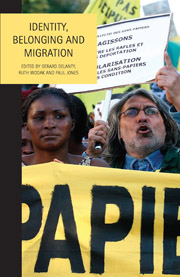Book contents
- Frontmatter
- Contents
- Acknowledgements
- List of Figures
- Notes on Contributors
- Introduction: Migration, Discrimination and Belonging in Europe
- I Theoretical Perspectives on Belonging
- II Institutional Forms of Discrimination
- III Cases of Belonging and Exclusion
- 11 Symbolic Violence
- 12 Voices of Migrants: Solidarity and Resistance
- 13 Transformations of ‘Dutchness’: From Happy Multiculturalism to the Crisis of Dutch Liberalism
- 14 Competent vs. Incompetent Students: Polarization and Social Closure in Madrid Schools
- Conclusion: Discrimination as a Modern European Legacy
- Index
12 - Voices of Migrants: Solidarity and Resistance
from III - Cases of Belonging and Exclusion
- Frontmatter
- Contents
- Acknowledgements
- List of Figures
- Notes on Contributors
- Introduction: Migration, Discrimination and Belonging in Europe
- I Theoretical Perspectives on Belonging
- II Institutional Forms of Discrimination
- III Cases of Belonging and Exclusion
- 11 Symbolic Violence
- 12 Voices of Migrants: Solidarity and Resistance
- 13 Transformations of ‘Dutchness’: From Happy Multiculturalism to the Crisis of Dutch Liberalism
- 14 Competent vs. Incompetent Students: Polarization and Social Closure in Madrid Schools
- Conclusion: Discrimination as a Modern European Legacy
- Index
Summary
[The] binary division between resistance and non-resistance is an unreal one. The existence of those who seem not to rebel is a warren of minute, individual, autonomous tactics and strategies which counter and inflect the visible facts of overall domination, and whose purposes and calculations, desires and choices resist any simple division into the political and the apolitical. The schema of a strategy of resistance as a vanguard of politicization needs to be subjected to re-examination, and account must be taken of resistances whose strategy is one of evasion or defence.
Colin Gordon on Michel Foucault, cited in Scott 1985: iiIndividuals resist the imposition of illegitimate powers in a wide variety of ways. Sometimes this resistance is framed collectively – drawing heavily on notions of solidarity – while at other times it takes on a much more individualized character. After briefly outlining the relationship between resistance and solidarity we suggest that how migrants define resistance is an empirically significant question whose answer should not be taken for granted, as the actual strategies employed by those in positions others seek to impose vary greatly with context. We seek to contextualize this claim by using migrants' discourses to illustrate how strategies for resisting discrimination are played out in various ways. Our aim in doing this is to draw attention to the ‘everyday’ nature that much resistance to oppression takes; a major contention in this chapter is that just as the discrimination faced by migrants is broad, disparate and often elusive, accordingly challenges to illegitimate uses of power are also (necessarily) many and varied.
- Type
- Chapter
- Information
- Identity, Belonging and Migration , pp. 241 - 260Publisher: Liverpool University PressPrint publication year: 2011
- 2
- Cited by



